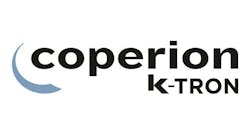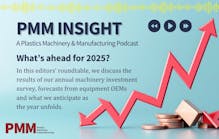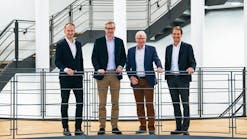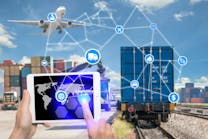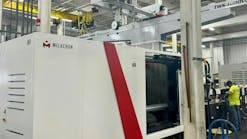As VP of sales and marketing, Monika Gneuss has been the face of Gneuss Inc. for 22 years.
She is a regular attendee at trade shows, where she staffs a booth or delivers technical presentations on extrusion technology for Gneuss, the North American subsidiary of extruder and filtration system manufacturer Gneuss Kunststofftechnik GmbH, Bad Oeynhausen, Germany.
Born in Germany, Gneuss is the daughter of two schoolteachers, but rather than follow in their footsteps, she developed an interest in mechanical engineering and plastics.
After completing her studies for a doctorate in mechanical engineering from RWTH Aachen University, she married Daniel Gneuss, whom she met while studying at Aachen. He is the son of Detlef and Christel Gneuss, who founded the company in 1983.
The rapidly growing company already had a presence in the U.S. but wanted to expand. The newlyweds decided to launch a new life together in Matthews, N.C., where Daniel now is president of Gneuss Inc. Detlef and Christel have since retired, and Daniel has taken over responsibility for operations in North and South America, while his brother, Stephan, is responsible for operations in Bad Oeynhausen.
In its early years, the company specialized in rotary filtration systems and screen changers. In 2007 Gneuss introduced its first MRS (multi-rotation section) extruder suitable for recycling PET bottle flake. The MRS — combining a single-screw extruder with a multiple-screw section — processes the PET without pre-drying by using a simple water ring vacuum system.
Today, extruders account for about half of all sales, Gneuss said.
She spoke with Plastics Machinery & Manufacturing Senior Staff Reporter Bruce Geiselman about what brought her to the U.S. and differences between the U.S. and European markets.
Where did you attend college?
Gneuss: I went to college in Germany at the Technical University of Aachen [RWTH Aachen University]. I studied mechanical engineering. I have a master’s in mechanical engineering and a Ph.D. from Aachen in mechanical engineering. I received my master’s in 1996 and about three years later, but officially it came through in 2000 after we had already moved to the U.S., I received a Ph.D. I handed everything in in 1999, but it takes a while to go through the system.
What was your first job out of college?
Gneuss: After I earned my master’s degree, I worked at a research institute in Mainz part time so that I had the opportunity to parallel work on my Ph.D. My first job was as a research engineer at the Mainz Institute of Microtechnology.
Today, that Institute is part of the Fraunhofer [Institute], but back then. it was an independent research institute focusing on microtechnology. There was a plastics group, and we were making tiny little plastics part, for example, for biomedical analysis.
What is it that attracted you to the plastics field?
Gneuss: That’s a good question because my parents were both teachers. I wasn’t really exposed to engineering, but I always loved math and sciences.
I made the decision that engineering is better than just studying sciences or math; it’s more practical.
Not really knowing what I was really going to do or what to expect, I just decided I’m going to study mechanical engineering. And then during the first two years there, there were plenty of material science classes within that degree, and I really thought plastics is a great material.
Then I really started specializing in my master’s degree in plastics technology. Aachen’s IKV (Institute for Plastics Processing) is well-known as a leading research institute in plastics technology, and a part-time job as a student assistant at IKV exposed me to basic research and some hands-on experience. My path was very academic at that point. It’s just because I liked it. I thought it was interesting. I was good at it. I got good grades.
How long have you worked in the plastics industry?
Gneuss: I would say 26 years.
How did you join Gneuss?
Gneuss: I met my husband during my master’s degree in Aachen. He’s also a mechanical engineer, and he was also specializing in plastics technology. He also worked as a student assistant at IKV.
We met there. We started dating. I went on to work on my Ph.D. He in, I think 1997, already joined his parents at Gneuss.
He soon became responsible for North America. He saw that there was so much opportunity for Gneuss in North America. He presented me with this idea. If we want to do something together, let’s do this. Let’s go to the U.S. Let’s build Gneuss Inc. for my family’s business. I was young, and I thought that was exciting. So, I said, let’s do it. We did it. We got engaged, we got married, we moved to the U.S. and here we are.
Did you immediately move to the U.S. after joining the company?
Gneuss: I started in Germany for six months or so. But that was more for training purposes, to see manufacturing, to learn about the product, and to get to meet everybody. But from the beginning, the goal was to be here at Gneuss Inc. I’ve always been VP of sales and marketing.
Here at Gneuss Inc., we are responsible for North America. We have several sales managers covering most of North America, but I have a small sales territory that I am directly responsible for.
And then, of course, I’m responsible for marketing.
I go to a lot of shows. That’s why some people think of me as the face of Gneuss, because I do go to a lot of shows and conferences and give presentations.
I have a little sales territory. So, I have customers that I have to sell our equipment to and work with them to make that equipment be successful. We’re a small company. I have different hats. I’m also responsible for H.R. and for insurances. There are a lot of different hats when it’s a smaller family-owned business. It’s never boring; that’s a good part.
What is the most rewarding part of your job?
Gneuss: I enjoy going to conferences and shows. I enjoy meeting customers, especially new customers. I think it’s a great group of people in the plastics industry, and I’ve made many, many friends over the years.
Tell me about the history of Gneuss.
Gneuss: It was founded in 1983 by my father-in-law, with the support of my mother-in-law.
When we came here to the U.S., the company wasn’t even 20 years old.
From the beginning, there’s been steady growth. We’ve added new products to the portfolio. We’ve always been a very innovative company, but it’s not just my husband. There’s also my husband’s brother — my brother-in-law. It’s a real, strong family business. And 10 years ago, the company was turned over to the sons — my husband and my brother-in-law. Compared to some other machinery manufacturers, we’re still the new kids on the block.
In your early years in the business, who was your mentor? Who did you admire and why?
Gneuss: The obvious answer is my father-in-law, Detlef Gneuss, who really built this company out of nothing.
He’s a very technical person, very hands-on, and he has that entrepreneurial spirit to start a company like Gneuss out of nothing. And then when we were in the U.S., he was always there to give us advice if we ran into challenges, maybe with a difficult customer or a technical challenge. If you’re talking to somebody at Gneuss, he’s the man.
Is he retired now?
Gneuss: Correct. He just turned 80 earlier this year. My father-in-law and mother-in-law turned over Gneuss to Stephan and Daniel about 10 years ago, but that whole process started much earlier. We all worked together for many, many years. But by 2013, everything was formalized, and they are enjoying their well-earned retirement now.
When did the company open an office in the U.S. and why?
Gneuss: The first office opened before my time, in 1990 outside of Philadelphia.
Germany, or my father-in-law, saw that there would be a lot of potential in the U.S.
Then, how do we service the U.S. from Bad Oeynhausen, Germany? Let’s open an office; let’s try to sell our equipment in the U.S.
Then within four years or so, I think by 1994, that office moved here to Matthews, N.C. By the time Daniel and I arrived, it really was like a two-man show with an office manager who is still with us today, and there was a sales/service manager who was supposed to sell our equipment, service it, start it up, take spare parts orders. There was a lot to do.
We didn’t start that office completely from scratch, but we moved to North Carolina in early 2000 with the intention to improve communications with our headquarters, hire and train a good team, adapt to the North American market where necessary and, of course, grow our market share here.
What prompted the decision to move Gneuss from Philadelphia to North Carolina?
Gneuss: It was before my time, but my understanding is there was some personnel turnover.
Also at the time, there was cooperation with another European machinery manufacturer that was established here in Matthews, N.C. We opened an office very close by in the same business park. It was the result of some strategic decisions.
There is a big German community here in Charlotte and throughout North and South Carolina. There are quite a few companies similar to us — family owned, like daughter companies, to European manufacturers. It’s a good environment with direct flights to Germany, whether it's for shipping parts or for us to go there or for our service technicians to go for training and so on.
How is the growth potential in North America compared with the rest of the world?
Gneuss: It’s great. North America is a huge market for the plastics industry, and coming from Germany, I’d have to say it’s a dynamic market.
It’s probably a little less risk-averse than Europeans for us, as we see ourselves as a very innovative company, and we have new technologies. We’ve been surprised that that we’ve been very well-received with these innovative technologies. In North America, I think there’s a more dynamic mindset. But it’s in general a really big market with a lot of potential.
What effect has the pandemic had on sales?
Gneuss: At first, I would say there was a little bit of shock. Everybody was shocked. Where’s this going?
There was very little activity for a few months, but since then, everybody has tried to make up for that lost time. As a lot of our equipment goes into recycling applications or in some way is connected to recycling applications, we are very busy.
Our challenges today are certainly not the pandemic, but supply chain, getting parts and so on. I think that’s much bigger. That’s having a bigger effect now than maybe the pandemic ever had.
Since everything is manufactured in Germany, how do you overcome that? What kind of lag are you experiencing if someone orders equipment today?
Gneuss: We have the longest delivery times that we’ve ever had, I think, at Gneuss.
To get the equipment from Germany to here, we fly most of our equipment so it gets to our customers within a week typically, so not a big lag at all. When it gets to a certain size, it can go by ocean. Freight costs have definitely gone up. So, that’s having an effect. There were less planes for a while during the pandemic. That’s also true.
I think it first affected costs and then sometimes it affected how long it will take. I would say the biggest impact there would be freight costs, though.
Gneuss sells both filtration systems and extruders; which is the bigger part of your business?
Gneuss: We started out with filtration systems, and we added extrusion technology. I think the first time we exhibited an extruder was in 2007 at K 2007. Since then, that part has really brought Gneuss a lot of growth, and by now it’s almost 50/50 filtration and extrusion.
That was a pivotal moment for the company when we introduced our MRS extruder. That changed our company and has brought us a lot of growth.
How has the industry changed in recent years?
Gneuss: I’m not sure I can talk for all extruder manufacturers, but for us, there’s been some relatively recent change.
Thank God, we started before the pandemic to bring a lot of manufacturing steps in house. At the beginning, we relied a lot more on local vendors that manufactured parts, but we started bringing a lot of the steps in house to be able to really control things, to train, to have good quality controls. That proved super helpful once the pandemic hit, and once these supply chain issues hit. I’m not sure if that’s a general trend, but it might be from what I have heard from others. It’s one of the things we’ve changed in our manufacturing over the last decade or so.
What are the most significant equipment improvements that you’ve witnessed or been a part of developing?
Gneuss: If we’re talking about something I’ve been involved with, then of course, it’s our MRS extruder, which is really a unique extruder.
There were single-screw extruders and twin-screw extruders, and there were already multiple-screw extruders, but I do think ours is one of the more revolutionary developments of the last 15 years or so. We’ve really come up with a new way to process polyester bottle flakes with a multiple-screw extruder for optimum devolatilization.
What are some of the most important company milestones?
Gneuss: The MRS extruder that we introduced in 2007 really changed our company from being just an auxiliary equipment manufacturer to an extruder manufacturer. We are able to offer complete lines.
It also really solidified us as a recycling equipment manufacturer. Of course, filters are necessary in recycling, but our extruder was really specialized at the beginning for polyester recycling. Now we’re improving things and adding other materials to that, but I would say that was a pivotal development for Gneuss.
How does the company’s portfolio differentiate it from the competition?
Gneuss: We always had the philosophy that we only wanted to offer technologies where we felt we have a unique edge.
Of course, there are other filters out there, but nobody else has the rotary technology that we offer. And with the extruder, the same thing. Obviously, there are plenty of other extruders out there, but ours with the multiple-screw design is a very unique design. I would say, in each case, we have uniqueness. We didn’t take others’ technologies and improve on them.
Do you see differences between what U.S. customers want compared to customers in Europe?
Gneuss: There are a lot of similarities, but there are also some differences. To start with, everything tends to be bigger. Not just houses and cars, but also throughputs, extruders and filtration systems.
I think that here there may be an even higher interest in fully automatic equipment because there’s a very small labor pool, or it seems the labor pool is getting smaller and smaller. Nobody can find any help. The skills level sometimes is not there. I think that’s a little different compared to Europe. So, when we talk about controllers, maybe there’s more of a demand here to have things fully automated, remotely accessible, self-improving, even.
The main things are the same — we all want to process plastic materials to make sheet and so on — but there are subtle differences. Being a global company, we can learn from each other and improve on each other and, hopefully, come up with the best solution.
To what do you attribute your company’s success?
Gneuss: On the one hand, to the fact that we offer leading-edge, innovative technology, for sure.
But there’s also our team of people. We’re a family-owned company. We’re all pulling the same direction. I would say we have little turnover in our sales and service teams. That brings experience to the team and trust from our customers. It’s a combination of having good technology that pays back and having a team to support that technology successfully.
What is your company working on?
Gneuss: Come and visit us at the K Show [in October in Dusseldorf]. At this point in the game, I can’t put anything out. I have to wait for the K Show to unveil anything new.
What do you think of Industry 4.0 and its future in the plastics industry?
Gneuss: I talked already a little bit about that. Systems are getting more intelligent. They can be remotely accessible. They are getting smarter and smarter.
I do think that applies to our industry and will improve our industry and hopefully help with the skilled worker shortage. If we make our plastics machinery more intelligent and fully automatic, I think that’s where things are going.
What will be the next major development in extrusion?
Gneuss: If we’re talking about things other than Industry 4.0, then, hopefully, we can develop a much better recycling infrastructure so that we can extrude more reclaim and provide more reclaim to brand owners that pledge to use this reclaim. I’m not sure that I am seeing it, but I would hope one of the major developments in the next years is a much better recycling infrastructure. I’m talking about collection, sorting, and all of that.
Is the U.S. behind Europe and much of the rest of the world in developing that recycling infrastructure?
Gneuss: I’m afraid to say, yes. Not in much of the world, but I would say in Europe or at least parts of Europe, they do have a better infrastructure to collect and sort materials. Yeah, I think the U.S. might be a little bit behind, which is a shame because there’s so much more material that could be collected, and it’s valuable. Brand owners want it, but if we throw it in the landfill, we can’t put it back into a bottle.
What do you miss about Germany, and how often do you get back there?
Gneuss: I miss, of course, my family. My parents are in Germany. I have two brothers and a brother-in-law, whom all have families now. I have 11 nephews and nieces in Germany.
But because of my job, I get to go to Germany several times per year. Then I look forward to eating German bread, German cakes, German sweets and German chocolate.
Otherwise, I’m very happy where I am. I mean, my family is here. We have three kids that have gone through the school system here. This is our home now. I’m glad that I get to go to Germany and visit, but this is home.
Do you have any hobbies?
Gneuss: Well, I have three kids. They’ve kept me busy, but now they’re getting older, so, I have a little more time. I run a little bit, read a little bit, but I like to spend time with my family.
JUST THE FACTS
Who is she: Monika Gneuss, VP of sales and marketing manager of Gneuss Inc.
Headquarters: Matthews, N.C.
Company founded: 1983 in Germany; U.S. office opened in 1990
Employees: 200 worldwide and 10 in Matthews
Age: 49
Bruce Geiselman | Senior Staff Reporter
Senior Staff Reporter Bruce Geiselman covers extrusion, blow molding, additive manufacturing, automation and end markets including automotive and packaging. He also writes features, including In Other Words and Problem Solved, for Plastics Machinery & Manufacturing, Plastics Recycling and The Journal of Blow Molding. He has extensive experience in daily and magazine journalism.

